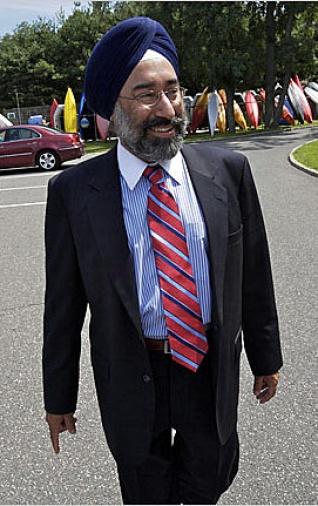People
A Double Take For Hizzoner
by PAUL VITELLOLAUREL HOLLOW, New York, U.S.A. - Harvinder Singh Anand, the new mayor of this Long Island village of multimillion-dollar homes, private beaches and yachtsmen, is, like many other residents, a successful business executive, a boater and a connoisseur of world travel.
His Sikh turban and beard drew double takes when he moved to the community about ten years ago, but it does not get many anymore. At least not among the locals.
Nonetheless, Mr. Anand's way of standing out in the crowd of Bermuda-shorts-and-loafer-wearing people who elected him in June - he ran unopposed - attracted television crews from American, Sikh/Punjabi and Indian networks to his inauguration on July 2. The newscasters described the election of Mr. Anand, 47, a New Delhi native who is the first member of any minority group to be mayor of this 95-percent-white community of 2,000 fronting on Cold Spring Harbor, in eastern Nassau County, as an unparalleled event.
In fact, he is part of what political analysts see as a new pattern: While minority candidates are usually propelled into office from densely-populated enclaves of their own ethnic groups, a small but recently growing number of Sikh-American and Indian-American officeholders has been getting elected in communities across the nation where they are the tiniest of minorities.
That group is so small that most of its members know each other and many reached out to congratulate Mr. Anand on his election, Nikki Randhawa Haley, a Sikh member of the South Carolina House of Representatives since 2004, being one such caller.
Some are Democrats and some Republicans, but they all share a high level of education and a crossover election appeal. It is a testament, perhaps, to the fact that, compared with other immigrant groups, Sikhs and Indians tend to speak English when they arrive and are ready to assume a place in the middle class.
Over all, the Census Bureau counts 2.3 million Sikhs and "Asian Indians" in the United States. In Iowa, Ohio, Kansas, Minnesota, South Carolina and Maryland, each of which has sent an Indian-American to its state legislature, the Sikh and Indian population is between zero and two percent. Mr. Chivukula, a Democrat from Somerset, N.J., represents a district where the Sikh/Indian and Pakistani population is somewhat higher, at six percent.
United States Representative Bobby Jindal, Republican of Louisiana, a second-generation Indian-American who was elected from a district whose population is 1.5 percent Asian, narrowly lost his bid for governor in 2003 and recently began a campaign for this year's election for governor - in a state where Sikh-Americans and Indian-Americans account for about one percent of the population.
Ingrid Reed, director of the New Jersey Project, a nonpartisan voter advocacy group financed by the Eagleton Institute of Politics at Rutgers University, said the pattern was probably unique in the history of American immigrants entering the electoral process. Usually, new immigrants win election from areas heavily populated by members of their own ethnic group, often with campaigns focused on issues of particular concern to that population.
But given Sikh and Indian immigrants' education and English proficiency, Ms. Reed said, they have been less apt than other immigrants to settle in enclaves. "After three or four decades, they are well established in their professions, and they seem to be reaching out toward political life", she said.
In contrast, Chinese, Japanese and Korean immigrants have largely settled in cities on the East and West Coasts and in Hawaii, which is mostly where they have been elected to public office. Besides Hawaii's two United States senators, there are a half-dozen United States representatives nationwide who identify themselves as Asian-American.
Many Asian immigrants "come from countries where voting is not necessarily promoted as a value", noted Christine Chen, executive director of APIAVote, a nonpartisan organization that promotes voting among Americans of Asian and Pacific Island heritage. "Sikh-Americans and Indian-Americans to some extent are different in that, with them, there is the ‘world's largest democracy' tradition".
The growing affluence of Asian-Americans of all backgrounds - Chinese, Pacific Islander, Korean, Japanese, Sikh and Indian - has led both the Democratic and Republican Parties in recent years to court them aggressively for campaign funds, votes, and their political talent as candidates, said Jay J. Chaudhuri, president of the Indian American Leadership Council, a Democratic-leaning group.
Sikhs and other Indians began to immigrate to the United States [though many Sikhs have made America their home since the end of the nineteenth century] in large numbers in the late 1960s, after a 1965 federal immigration law lifted quotas that had severely restricted Asians and other non-northern Europeans from becoming legal residents.
The law also established rules favoring immigrants with professional skills in science and technology.
The 1965 law made it possible for Mr. Anand, the newly elected mayor here, to immigrate in 1982, upon graduating from Punjab University with a degree in chemical engineering. After postgraduate work at Hofstra University on Long Island, he got a job with a small chemical company, then moved up to a larger company, and in 1995, formed his own company with a partner. It manufactures chemicals in the United States, China, India and Thailand.
Soon after moving to a gated community in Laurel Hollow, where the 2000 census says the median household income is $200,000, he became active in civic affairs. He organized the two dozen homeowners in his development to form a heating-oil-buyers' co-op and unify the system of garbage collection.
"At the end of the day, I am a businessman", said Mr. Anand, who ran without party affiliation in the village election, but calls himself a Reagan Republican. "I believe in efficiency and cost-effectiveness".
His wife, Dr. Chandni Anand, is an internist. They have two children, Nikita, 14, and Angad, 13.
A village trustee, John J. Fitteron, a retired Getty Petroleum executive, said, "Harry is just a highly capable individual who, like all of us, wants to give something back to the community".
In Laurel Hollow, that is expressed in the issuance of boat permits and the maintenance of roads, and in upholding the zoning code in negotiations with very rich people over their wishes to build very big houses.
Last Wednesday, Mr. Anand arrived at his office in Village Hall, which sits on a lawn overlooking the village's private beach, wearing his usual business suit. He checked in with the clerk and treasurer, Karen Navin, and her deputy, Nancy Popper, attended to business about permits for residents who wanted to cut down some trees, then stepped outside, where most of the people wore dripping-wet bathing suits.
"Harry Anand", he said to one after another on his stroll across the lawn, gripping wet hands and making eye contact with people, a few of whom seemed unable to keep their eyes from the turban.
If Mr. Anand noticed, he did not show it. "I'm the mayor of Laurel Hollow", he said with a polished smile. "Just elected. So nice to meet you".
[Article, courtesy: The New York Times. Photos: by Todd Heisler and Phil Marino, for The New York Times.]
Conversation about this article
1: Tejwant (U.S.A.), August 02, 2007, 2:11 PM.
This gives a totally new meaning to Baywatch, the famous TV series.:-)
2: Amitoj Singh (New Jersey, U.S.A.), August 11, 2007, 2:51 PM.
Congratulations to Harvinder Singh Anand!
3: Harvinder Singh Anand (Delhi, India), August 22, 2010, 11:56 AM.
I am proud of you ... Waheguru Sache-Patshah hor kamyaabi deve, kaum da nam uccha karo te Guru-ghar diyan khushiaan paraapat karo ji.





